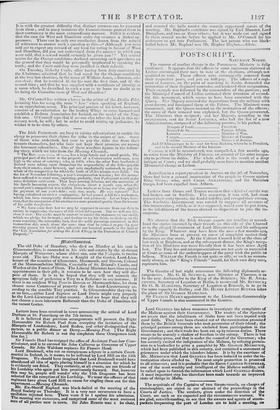The Irish Protestants are busy in raising subscriptions to enable
the clergy to prosecute their claims for tithe in the courts of law. Some of those who undertook last year to pay the tithe due from their tenants themselves, but who have not kept their promise, are among the foremost subscribers. One of these worthies figures in the follow- ing story, which we take from the Morning Chronicle. " The Rev. -, of _____, has a large family and a small parish. The principal part of the latter is the property of a Conservative nobleman, very high in the odour of sanctity; who, in 1834, when the other Tory landlords of Ireland were taking upon themselves the responsibility of the tithes payable from their estates, came forward, and very emphatically undertook to pay the whole of the composition for which the lands of all his tenants were liable. On the 1st of November following, a year's compensation was due ; but the incum- bent suffered it to stand over, expecting, probably, that Parliament would make some definitive settlement. That hope proving delusive, and the necessities of his family becoming urgent, the clergyman, about a mouth ago, when the second year's composition was within three weeks or so being due also, applied for payment of one year's debt : only one, mark. Ile Wag refused! Not having calculated on such a contingency, he had passed a bill to a tradesman, which has been consequently dishonoured and protested. Let us hope, how- ever, that the compassion of his creditor is a more practical quality than the honour of his noble boujiietor. t, We have some fears lest we may be supposed to swerve from our duty to society in suppressing the name of this titled delinquent. But we will not dis- close it note. The reader must be content to receive the statement on our credit, which we pledge for its truth ; and further to try his faith, we declare, on the same warranty, the astounding fact, that the noble personage concerned in this transaction did, much about the same time that lie refused to pay the 1mor starving parson his lawful debt, suberibe one hundred pounds to the fund of the Lay Association for aiding the b ish Clergy in the Protection of Church Property.' "


























 Previous page
Previous page